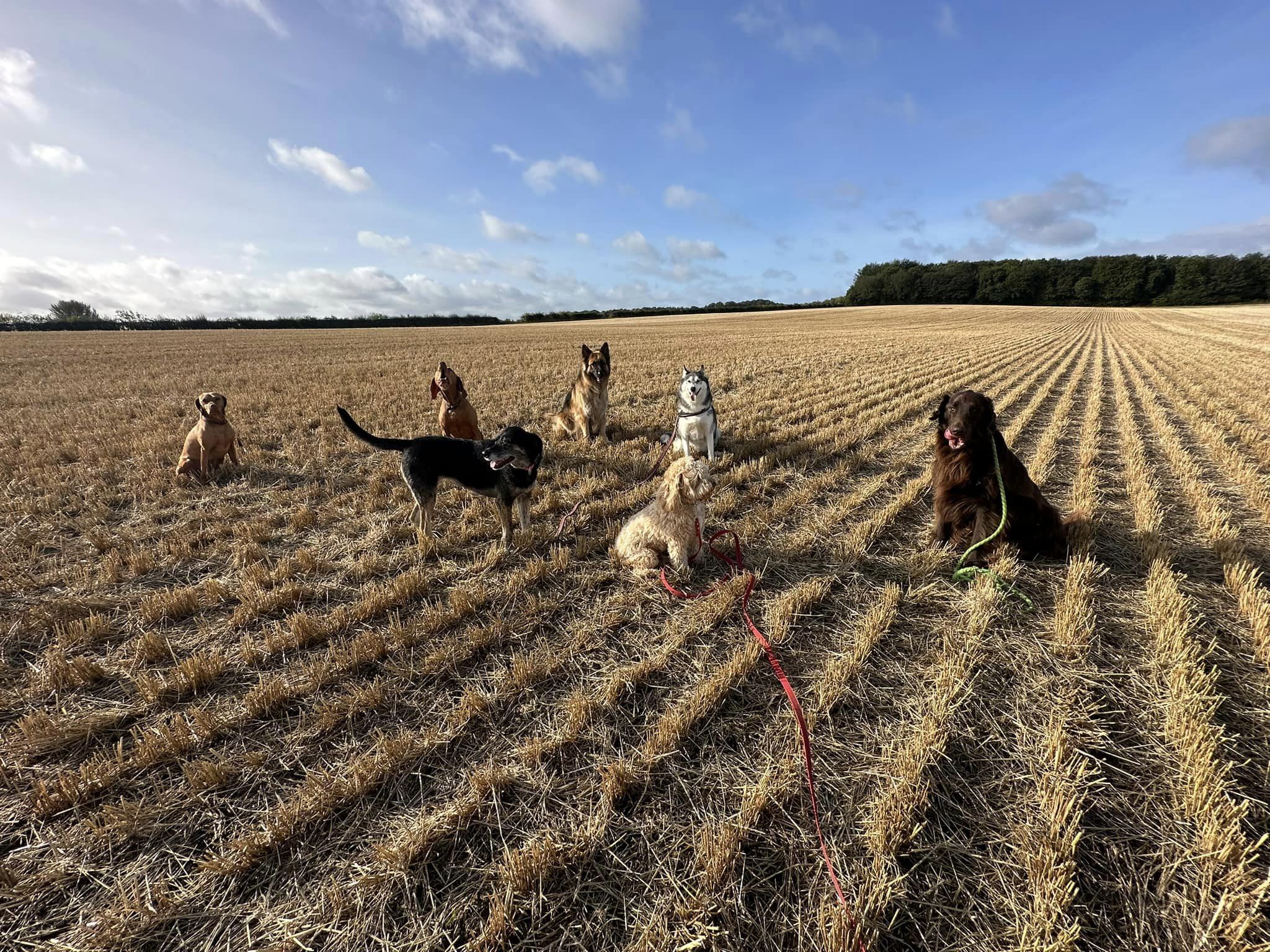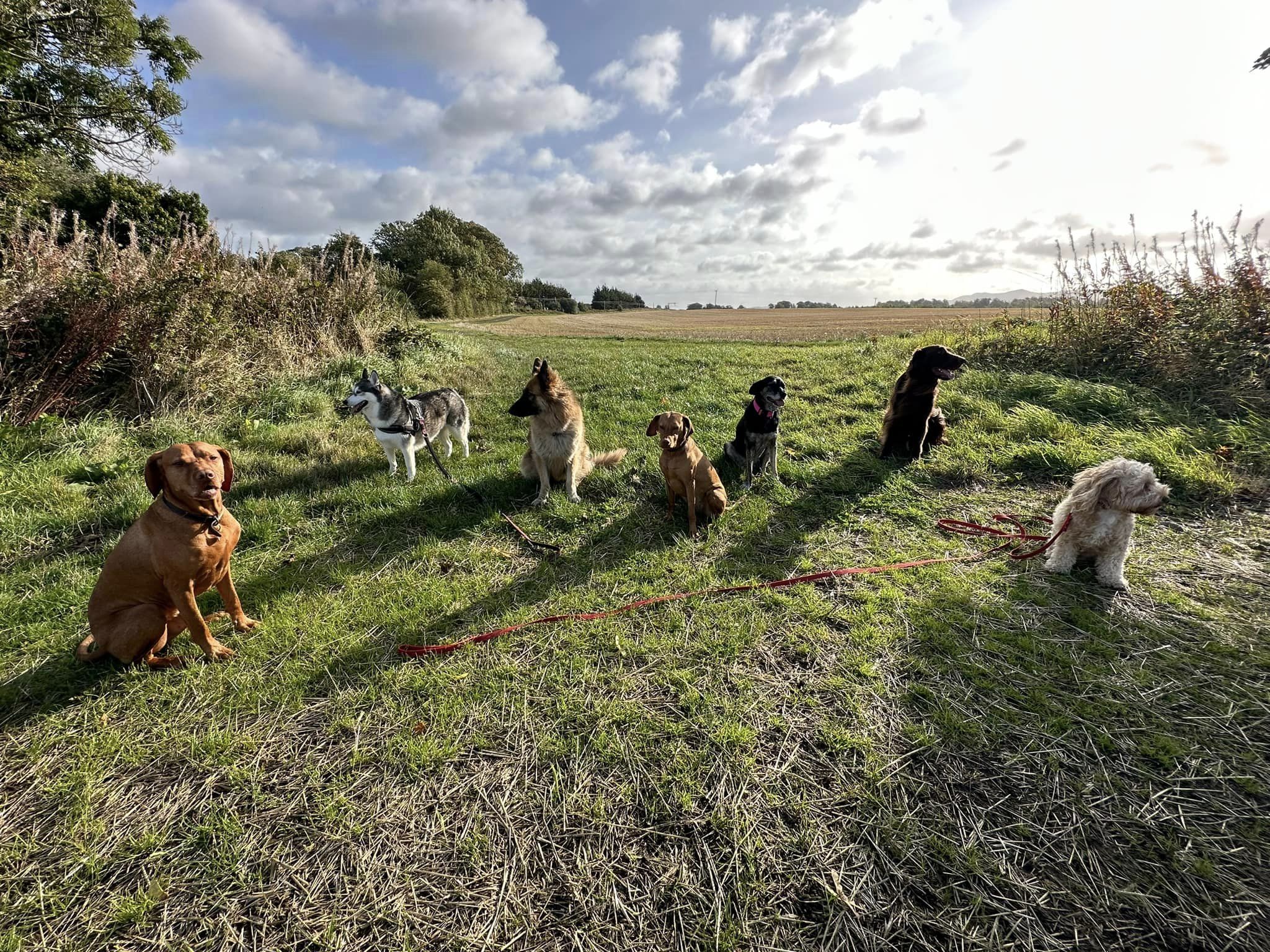Destructive Behavior in Dogs: Understanding, Preventing, and Correcting Costly Issues
02/10/2023 - Dog Blog
As a professional dog walkers and trainers at Dugs Paws we understand the significance of fostering positive behaviors in our canine companions.
However, even the most well-behaved dogs can sometimes exhibit destructive behaviors, which can be both costly and frustrating for their owners. In this article, we will dive into the common causes behind destructive behavior and provide practical tips to prevent and correct these issues, ensuring a harmonious relationship between dogs and their owners.

Understanding Destructive Behavior
Destructive behavior in dogs encompasses various unwanted activities, such as chewing on furniture or other objects, digging holes in the yard, excessive barking, or scratching doors and walls. It's essential to recognize that these behaviors are not driven by malicious intent; instead, they often stem from innate instincts, boredom, anxiety, or unmet needs.
🐶 Boredom and Excess Energy:
One of the primary reasons for destructive behavior is boredom and pent-up energy. Dogs, especially active breeds, require mental and physical stimulation. Without adequate outlets for their energy, they may resort to destructive activities to alleviate their restlessness.
🐶 Anxiety and Stress:
Anxiety and stress can manifest in destructive behavior. Dogs may chew on objects or dig holes as a way to cope with their emotions, providing temporary relief from their feelings of unease.
🐶 Lack of Proper Training:
Insufficient training or inconsistent boundaries can lead to destructive behaviors. Dogs need clear rules and guidance from their owners to understand acceptable behaviors.
🐶 Teething:
In puppies, destructive chewing is often related to the teething process. Chewing helps relieve the discomfort of emerging teeth, but without proper guidance, they may target inappropriate items.
🐶 Attention-Seeking:
Dogs are social animals that thrive on attention from their owners. If they feel neglected, they may engage in destructive behavior to gain attention, even if it's negative.
Preventing Destructive Behavior
Prevention is the key to curbing destructive tendencies in dogs. Here are some practical tips to help owners avoid the costly consequences of destructive behavior:
🐶 Provide Sufficient Exercise:
Regular walks, playtime, and engaging activities are crucial to channel your dog's energy positively. Tailor the exercise routine to match your dog's breed and energy level.
🐶 Mental Stimulation:
Introduce puzzle toys, interactive games, and training sessions to keep your dog's mind engaged and active. Mental stimulation can be as exhausting as physical exercise.
🐶 Create a Safe Space:
Designate a safe area where your dog can spend time when unsupervised. Use crate training or baby gates to limit access to certain rooms or areas with valuable objects.
🐶 Appropriate Toys:
Offer a variety of durable chew toys specifically designed for dogs. Rotate the toys regularly to keep their interest high.
🐶 Consistent Training:
Enroll dogs in obedience classes and practice consistent training at home. Use positive reinforcement to reward good behavior.
Correcting Destructive Behavior
If destructive behavior has already become a habit, it's not too late to correct it. Here's how you can address these issues effectively:
🐶 Redirect Behavior:
Catch your dog in the act and immediately redirect their attention to an appropriate toy or activity. Praise and reward them for choosing the correct option.
🐶 Do Not Punish:
Avoid punitive measures like yelling, hitting, or scolding your dog after the fact. Punishment can lead to fear and worsen the problem.
🐶 Timeouts:
When your dog misbehaves, consider giving them a brief timeout in their crate or designated safe space. This will help them associate the unwanted behavior with a loss of freedom.
🐶 Seek Professional Help:
For severe cases of destructive behavior or when you're unable to address the issue on your own, recommend professional assistance from a certified dog trainer or veterinary behaviorist.
Destructive behavior in dogs can be a trying challenge for owners, but it's essential to remember that patience, consistency, and understanding are key to addressing these issues.


By providing adequate physical and mental stimulation, setting clear boundaries, and employing positive reinforcement, owners can prevent and correct destructive behavior, fostering a happy and harmonious bond with their canine companions.
As professional dog walkers and trainers, we play a pivotal role in guiding owners towards a peaceful coexistence with their beloved pets 💞🐕🦺
However, even the most well-behaved dogs can sometimes exhibit destructive behaviors, which can be both costly and frustrating for their owners. In this article, we will dive into the common causes behind destructive behavior and provide practical tips to prevent and correct these issues, ensuring a harmonious relationship between dogs and their owners.

Understanding Destructive Behavior
Destructive behavior in dogs encompasses various unwanted activities, such as chewing on furniture or other objects, digging holes in the yard, excessive barking, or scratching doors and walls. It's essential to recognize that these behaviors are not driven by malicious intent; instead, they often stem from innate instincts, boredom, anxiety, or unmet needs.
🐶 Boredom and Excess Energy:
One of the primary reasons for destructive behavior is boredom and pent-up energy. Dogs, especially active breeds, require mental and physical stimulation. Without adequate outlets for their energy, they may resort to destructive activities to alleviate their restlessness.
🐶 Anxiety and Stress:
Anxiety and stress can manifest in destructive behavior. Dogs may chew on objects or dig holes as a way to cope with their emotions, providing temporary relief from their feelings of unease.
🐶 Lack of Proper Training:
Insufficient training or inconsistent boundaries can lead to destructive behaviors. Dogs need clear rules and guidance from their owners to understand acceptable behaviors.
🐶 Teething:
In puppies, destructive chewing is often related to the teething process. Chewing helps relieve the discomfort of emerging teeth, but without proper guidance, they may target inappropriate items.
🐶 Attention-Seeking:
Dogs are social animals that thrive on attention from their owners. If they feel neglected, they may engage in destructive behavior to gain attention, even if it's negative.
Preventing Destructive Behavior
Prevention is the key to curbing destructive tendencies in dogs. Here are some practical tips to help owners avoid the costly consequences of destructive behavior:
🐶 Provide Sufficient Exercise:
Regular walks, playtime, and engaging activities are crucial to channel your dog's energy positively. Tailor the exercise routine to match your dog's breed and energy level.
🐶 Mental Stimulation:
Introduce puzzle toys, interactive games, and training sessions to keep your dog's mind engaged and active. Mental stimulation can be as exhausting as physical exercise.
🐶 Create a Safe Space:
Designate a safe area where your dog can spend time when unsupervised. Use crate training or baby gates to limit access to certain rooms or areas with valuable objects.
🐶 Appropriate Toys:
Offer a variety of durable chew toys specifically designed for dogs. Rotate the toys regularly to keep their interest high.
🐶 Consistent Training:
Enroll dogs in obedience classes and practice consistent training at home. Use positive reinforcement to reward good behavior.
Correcting Destructive Behavior
If destructive behavior has already become a habit, it's not too late to correct it. Here's how you can address these issues effectively:
🐶 Redirect Behavior:
Catch your dog in the act and immediately redirect their attention to an appropriate toy or activity. Praise and reward them for choosing the correct option.
🐶 Do Not Punish:
Avoid punitive measures like yelling, hitting, or scolding your dog after the fact. Punishment can lead to fear and worsen the problem.
🐶 Timeouts:
When your dog misbehaves, consider giving them a brief timeout in their crate or designated safe space. This will help them associate the unwanted behavior with a loss of freedom.
🐶 Seek Professional Help:
For severe cases of destructive behavior or when you're unable to address the issue on your own, recommend professional assistance from a certified dog trainer or veterinary behaviorist.
Destructive behavior in dogs can be a trying challenge for owners, but it's essential to remember that patience, consistency, and understanding are key to addressing these issues.


By providing adequate physical and mental stimulation, setting clear boundaries, and employing positive reinforcement, owners can prevent and correct destructive behavior, fostering a happy and harmonious bond with their canine companions.
As professional dog walkers and trainers, we play a pivotal role in guiding owners towards a peaceful coexistence with their beloved pets 💞🐕🦺





